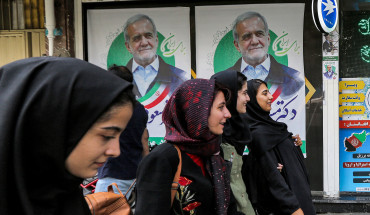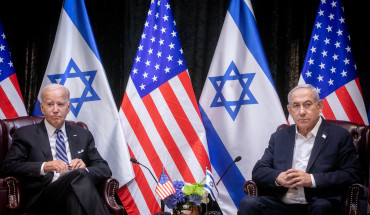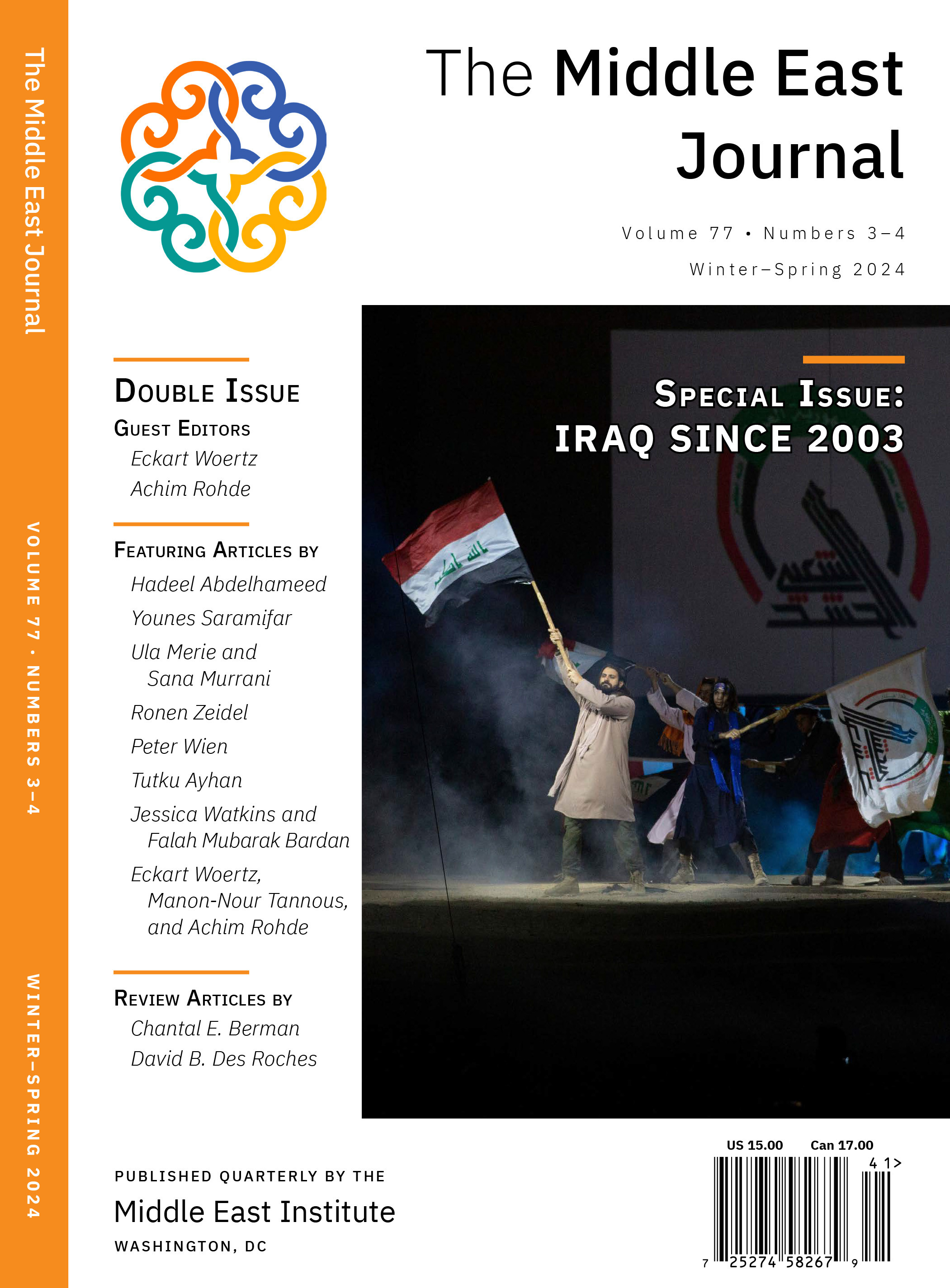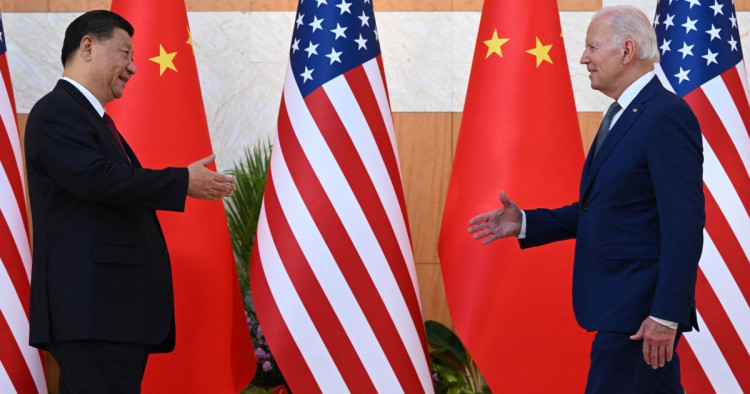This piece is part of the series “All About China”—a journey into the history and diverse culture of China through short articles that shed light on the lasting imprint of China’s past encounters with the Islamic world as well as an exploration of the increasingly vibrant and complex dynamics of contemporary Sino-Middle Eastern relations. Read more ...
In July 2022, US President Joe Biden mentioned countering China as one of the reasons for his trip to Saudi Arabia.[1] Yet, the agreements that were signed and the declarations made during Xi Jinping’s visit to Riyadh in early December showed that the American leader’s efforts were not successful. The comparison between Biden’s frosty July reception and the red carpet rolled out for his Chinese counterpart added insult to injury.
Against this background, I was invited to join a group of experts and practitioners to examine the changing China-United States-Middle East relationship at a December 14 event organized by the Middle East Institute. I was asked to discuss how China might respond to American attempts to limit its perceived greater influence. Speaking before me, Ambassador Chas Freeman provided a scathing account of Washington’s Middle East policy, thereby prompting me to say that China will have little need to react, if the United States does not change course of action.
Here, I develop this line of thought further. There is often the tendency to imagine the United States and China involved in a strategic back-and-forth, launching new initiatives and implementing new approaches to the Middle East and North Africa (MENA). However, as I argue in this article, the substance of the two countries’ behavior in the region and toward each other is unlikely to change in the foreseeable future. It is probable that they will do more of what they are already doing: Washington will continue to focus on security issues and defense cooperation while Beijing will stick to its trade and investment-centered agenda. This is not because Chinese and, especially, American leaders do not want change. Rather, domestic and international factors make alternatives to the current approach pursued by Washington and Beijing difficult to produce. Thus, I conclude, for the time being China seems well placed to continue expanding its influence, at least within certain limits.
Washington’s Unchanging Response
Elected to office having promised a clean break from Donald J. Trump, Joe Biden’s foreign policy is remarkably like that of his predecessor, at least vis-à-vis China. It is true that Biden has been placing more emphasis on multilateralism. However, as Stephen M. Walt pointed out, the administration’s emphasis on preserving the “rules-based international order” seems just another way to frame a more straightforward strategy of containment against China.[2] Washington is trying to create an “order of exclusion” by increasingly exploiting its central role in key institutions and industries to prevent China from accessing, for example, the most-cutting edge technologies.[3]
The development and consolidation of this strategy has naturally shaped the American approach to China in the Middle East. In the past, the US China policy was, at least to some extent, a function of Chinese actions in the region. The bargain between the two countries on the UN Resolution 678 of November 1990 – the one that gave Iraq until 15 January 1991 to withdraw from Kuwait and empowered states to use “all necessary means” to force it out of Kuwait after the deadline – is a good example of this.[4] Yet, as preserving its primacy in East Asia has become the top priority for the United States, the relationship between its China and Middle East policies has inverted. Today, American behavior in the region is increasingly influenced by trends in Sino-American relations. As such, Middle Eastern countries are feeling growing pressure to join the efforts to contain China. Because Chinese companies play an important role in many economies and development agendas in the region, acceding to Washington’s request is not something that comes cheap for MENA policymakers.[5]
Since imposing economic costs on one’s own partners rarely pays, the American response to the perceived expanding Chinese influence should not neglect greater economic engagement with the region. This is especially true as there is no real Middle Eastern demand for Chinese regional security products, and there is no substantial Chinese offer either. In other words, proposals of greater security cooperation alone will hardly compensate for the Middle Eastern countries’ costs of forcibly reduced economic cooperation with China. That “China can’t replace the U.S. as a regional security guarantor” matters only to some extent, regardless of what some believe.[6] Hence, Rush Doshi emphasized that although the United States should not compete with China “dollar-for-dollar, ship-for-ship, or loan-for-loan,” it still “should fund alternatives to those projects that have the greatest strategic potential (e.g., dual-use port projects, undersea cables, airfields) or work to multilateralize Chinese funding to ensure the United States has a seat at the table.”[7] Michael Singh stressed the need to “provide tangible benefits in the form of increased access to U.S. and European markets or technology.”[8]
The Biden administration is aware of this issue. As clearly stated in the latest US National Security Strategy, military and defense-related/framed solutions cannot be the default choice to deal with challenges in the region.[9] However, there is good reason to doubt that this will change. Biden is not the first American leader to propose and then fail to rebalance American foreign policy from over-reliance on the military toward greater use of diplomacy and economic tools of statecraft.[10] One of the main problems is that policy substitution, i.e., using one policy instrument instead of another to achieve the same goal, is difficult to achieve.
American leaders have long faced challenges of different magnitude depending on what policy tool they want to use. While the president can deploy some with a certain degree of freedom, others require approval from Congress. Among the latter, if and how they are used also depends on the outcome of often difficult and time-consuming negotiations involving lobbies and interest groups. These challenges further increase in moments of heightened political divisions like today. This has made the use of military power and defense-related assistance the go-to option for American leaders.[11] For the same reasons, it is also relatively easy for presidents to threaten and implement certain types of sanctions, such as restricting US technology exports.[12] In comparison, providing foreign development aid and greater access to the American domestic market is much more difficult. Moreover, as shown in the case of the tender for operating Haifa’s Bayport Terminal in Israel,[13] foreign non-Chinese companies, including American ones, often are not interested in those projects that Middle Eastern governments deem important, thereby adding one more challenge to the Biden administration.
Hence, while it is up to American officials and policymakers to decide how the United States should respond to China’s influence in the Middle East, the ways in which they can do that are less under their control. The probability of more of the same is high, regardless of whether it works or not.
China’s Non-reaction
The debate in China about the country’s Middle East policy has grown vibrant over the years. Yet, a strong consensus on the necessity to avoid picking sides in disputes remains there. To varying degrees, Chinese experts oppose a deeper, possibly military involvement in the region. Instead, China should continue using its economic power to push local leaders to focus on economic development rather than regional rivalries.[14] Supporting industrialization is a key element of this strategy,[15] which, of course, is also beneficial to Chinese interests. Hence, the substance of China’s Middle East policy has remained rather unchanged over the years, with “pragmatic cooperation in various fields including the Belt and Road Initiative, trade and economy, energy and high technology” at its center.[16] At the same time, Niu Xinchun, the director of the China Institute of Contemporary International Relations’ Institute of Middle East Studies, summarized China’s engagement with regional security issues as “doing nothing, opposing something [at the UN].”[17]
Against this background, it is not only more reasonable for China to continue with its economic-focused approach, but also more feasible. To begin with, American behavior is already pushing regional players closer to China, and the Chinese know it. The research done in the context of the TOChina Hub’s ChinaMed Project shows that Chinese experts are indeed extremely consistent in pointing out how Washington’s actions create frictions with its own partners.[18] Similarly, they also know that economic and technological cooperation with China is extremely important, if not indispensable, for many Middle Eastern countries.[19] The fact that China is a major importer of oil and natural gas, of course, plays an important role as well. Moreover, as many countries in the region have been undergoing deep changes, especially in terms of state-religion relations,[20] China’s non-interference principle and some of its own domestic policies toward religious groups and minorities have also played a positive role in its relations with the Middle East.[21] Assuming that the policymakers in Beijing hold the same beliefs, it is difficult to think about a good reason for China to radically change its approach and try to compete with the United States in areas like regional security and military assistance wherein Washington is far stronger and far more invested.
This is not to say that China’s approach is free from problems. For example, experts like Li Weijian and Tian Wenlin acknowledge that Chinese initiatives, especially those unrelated to trade and investment, often fail to gain traction in the region.[22] China, they write, can offer much-needed economic support and a developmental experience that is different from the Western model. However, security issues still play a dominant role in Middle Eastern politics. Regional leaders do not fully grasp the usefulness of Chinese-led/proposed forums and dialogues. At the same time, other great powers, such as the United States, Russia, and some European countries, are more willing to intervene militarily or take sides in regional disputes. Chinese scholars are also aware that regional leaders and populations sometimes do not support Beijing’s actions, as it happened in the case of the vetoes cast by China at the UN Security Council over Syria in the early 2010s.[23]
Yet, for an alternative, more assertive and proactive Chinese Middle East policy to emerge would require overcoming a series of challenges.[24] To begin with, scholars tirelessly repeat that there is a lack of deep knowledge about the region in China. Moreover, thinking about a different strategy is also complicated by the insufficient coordination among the many domestic institutions that manage Chinese activities in the Middle East. This problem, they argue, is something that has already turned correct strategic choices into past implementation failures, irritating regional partners or causing economic losses for China. As the result of reforms enacted in 2018, including the upgrade of the Central Foreign Affairs Leading Small Group into the Central Foreign Affairs Commission and, reportedly, greater authority given to Chinese ambassadors abroad over officials from other ministries and state-owned companies,[25] this situation might change but it will take time, and managing a large number of bureaucratic and economic actors will always remain a challenge.
Importantly, growing tensions with the United States compound these problems. On the one hand, there is growing concern that Washington is trying to forge a coordinated Asia-Middle East policy aimed at containing China by putting pressure on its interests in more regions simultaneously.[26] On other hand, growing tensions in Asia also influence China’s diplomacy in other regions. Indeed, Li Wentao, the Deputy Director of the CICIR Institute of African Studies, wrote that the problems caused by the United States in Asia limit the “diplomatic resources” that China can invest elsewhere to promote and protect its interests.[27] At the same time, no Chinese expert equates American declining clout in the region with the end of the United States’ status as the most militarily and economically powerful and culturally influential extra-regional power. Reflecting this fact, regional problems cannot be solved without Washington’s support and cooperation, stated Niu Xinchun in his analysis of the limits of the Russian-led Astana Process.[28] In other words, Chinese foreign policymakers are facing many pressing issues at home and abroad. Therefore, they must pick their battles accordingly, and confronting the much more powerful United States in the Middle East does not seem one of them.
To summarize, the most likely reaction by Beijing to a possible American attempt to curb China’s influence in the Middle East is a non-reaction. Especially if Washington continues to pursue its current approach, Chinese policymakers will have little need to do something radically different from what they are already doing. At the same time, the just-mentioned problems that prevent the development of an alternative and more muscular approach are unlikely to disappear any time soon.
Looking Ahead
In this article, I developed some ideas regarding the future course of Chinese and American behavior in the Middle East, pointing out that continuity is far more likely than change. This is because policymakers in both countries face different but equally serious constraints on elaborating and implementing alternative strategies. Therefore, the reactions and responses to each other’s moves are likely to be just more of the same.
Against this background, it is important to consider the role of regional actors. Small and medium states want to maximize the support that they can gain from stronger powers.[29] At the same time, they are also particularly sensitive to attempts to reduce their autonomy.[30] Middle Eastern countries are not different and, therefore, are naturally more inclined to get closer with whoever do not ask them to choose to limit their own options. As such, China seems well placed to continue increasing its influence in the region, though this does not mean that it will become the most important extra-regional power any time soon. That is unlikely to be Beijing’s priority either.
That said, change is always brewing under the surface. Increased regional tensions produced, for example, by the return to power of Benjamin Netanyahu,[31] the evolution of the situation in Iran, the impact of a possible economic recession in the West as well the evolution of the war in Ukraine on oil prices, the situation of China’s post-Covid economy, and the approaching of the 2024 presidential elections in the United States are all factors that can alter current trends.
Note: I am grateful for the suggestions and comments that I received from Prof. Sun Degang and Dr. Mohammed Al-Sudairi.
[1] Joe Biden, “Opinion - Joe Biden: Why I’m going to Saudi Arabia,” The Washington Post, July 9, 2022, https://www.washingtonpost.com/opinions/2022/07/09/joe-biden-saudi-arabia-israel-visit/.
[2] Stephen M. Walt, “China Wants a ‘Rules-Based International Order,’ Too,” Foreign Policy, March 31, 2021, https://foreignpolicy.com/2021/03/31/china-wants-a-rules-based-international-order-too/.
[3] Kyle M. Lascurettes, Orders of Exclusion: Great Powers and the Strategic Sources of Foundational Rules in International Relations (New York, NY: Oxford University Press, 2020); Henry Farrell and Abraham L. Newman. “Weaponized Interdependence: How Global Economic Networks Shape State Coercion,” International Security 44, no. 1 (2019): 42–79.
[4] Yitzhak Shichor, “Decision-Making in Triplicate: China and the Three Iraqi Wars.” In Andrew Scobell and Larry M. Wortzel (eds.), Chinese National Security Decision Making under Stress (Carlisle, PA: Strategic Studies Institute, US Army War College, 2005), 191–228.
[5] John Calabrese, “CHIPS on the Table: Escalating Us-China Tech War Impacts the Mideast.” Middle East Institute, December 15, 2022, https://www.mei.edu/publications/chips-table-escalating-us-china-tech-war-impacts-mideast; Mohammed Soliman, “The Gulf Has a 5G Conundrum and Open RAN Is the Key to Its Tech Sovereignty,” Middle East Institute, January 12, 2022, https://www.mei.edu/publications/gulf-has-5g-conundrum-and-open-ran-key-its-tech-sovereignty.
[6] Philip Kine, “Xi Jinping takes his diplomatic charm offensive to the Middle East,” Politico, December 7, 2022, https://www.politico.com/news/2022/12/07/xi-jinping-china-saudi-arabia-summit-00072784.
[7] Rush Doshi, The Long Game: China’s Grand Strategy to Displace American Order (New York: Oxford University Press, 2021).
[8] Michael Singh, “The Middle East in a Multipolar Era: Why America’s Allies Are Flirting With Russia and China.” Foreign Affairs, December 7, 2022, https://www.foreignaffairs.com/middle-east/middle-east-multipolar-era?check_logged_in=1.
[9] White House, National Security Strategy, October 12, 2022. https://www.whitehouse.gov/wp-content/uploads/2022/10/Biden-Harris-Administrations-National-Security-Strategy-10.2022.pdf.
[10] John R. Deni, “Obama’s Failure to Demilitarize U.S. Foreign Policy,” War on the Rocks, October 20, 2015. https://warontherocks.com/2015/10/obamas-failure-to-demilitarize-u-s-foreign-policy/.
[11] Helen V. Milner and Dustin Tingley, Sailing the Water’s Edge: The Domestic Politics of American Foreign Policy (Princeton, NJ: Princeton University Press, 2015).
[12] Ibid.
[13] Galia Lavi, “China and National Infrastructure in Israel: Past the Peak,” Institute for National Security Studies Policy Analysis, July 2022, https://strategicassessment.inss.org.il/en/articles/china-and-national-infrastructure-in-israel-past-the-peak/.
[14] For example: Xi, Guigui, and Shuisheng Chen, “China’s Economic Diplomacy in the Middle East within the Framework of the Belt and Road Initiative,” Arab World Studies 6 (2016): 48–59 + 117 [in Chinese].
[15] Min Wei, “Theory and Policy Analysis of Sino-Middle Eastern Production Cooperation,” Arab World Studies 6 (2016): 3–20 + 116 [in Chinese].
[16] Ministry of Foreign Affairs of the People’s Republic of China, “Report summarizes key points in Sino-Arab ties,” December 3, 2022, https://english.www.gov.cn/news/internationalexchanges/202212/03/content_WS638a9adac6d0a757729e3f8d.html.
[17] Xinchun Niu, “China’s Middle East Strategy within the Framework of the Belt and Road Initiative,” Foreign Affairs Review 34, 4 (2017): 32–58 [in Chinese]
[18] For example: ChinaMed Project. “ChinaMed Observer - China Looks at the Mediterranean Region November 2022,” December 17, 2022. https://www.chinamed.it/observer/november-2022.
[19] Ibid.
[20] Naman Karl-Thomas Habtom, “Is the MENA Region Becoming Less Religious? An Interview with Michael Robbins,” Arab Barometer, April 6, 2020, https://www.arabbarometer.org/2020/04/is-the-mena-region-becoming-less-religious-an-interview-with-michael-robbins/.
[21] Andrea Ghiselli and Mohammed Alsudairi. “Exploiting China’s Rise: Syria’s Strategic Narrative and China’s Participation in Middle Eastern Politics,” Global Policy n/a, no. n/a. https://doi.org/10.1111/1758-5899.13094; Amjed Rasheed, “The Narrative of the Rise of China and Authoritarianism in the Global South: The Case of Egypt.” The International Spectator, December 17, 2021, 1–17. https://doi.org/10.1080/03932729.2021.2009641.
[22] For example: Weijian Li, “From Comprehensive Detachment to Active Engagement: China’s Middle East Diplomacy since the Reform and Opening-Up period,” Arab World Studies 5 (2018): 3–13 + 118 [in Chinese]; Wenlin Tian, “The Belt and Road Initiative and China’s Middle East Strategy,” West Asia and Africa 2 (2016):127–145 [in Chinese].
[23] Zhenhua Li, “Analysis of the Arab Online Public Opinion,” Arab World Studies 3 (2013): 107–120 [in Chinese].
[24] Meng Wang, “Discussing the Implementation of the Belt and Road in the Middle East,” Contemporary International Relations 3 (2017): 16–22 + 36 [in Chinese]; Xinchun Niu, “Imagination and Reality: China’s Middle East Policy,” West Asia and Africa 4 (2021): 25–53 + 156-157 [in Chinese]; Shengli Li, “The Development of Chinese Diplomatic Capabilities: Meaning and Direction,” International Studies 2 (2022): 20–36 + 153–154.
[25] Peter Martin, Keith Zhai, and Ting Shi, “As U.S. Culls Diplomats, China Is Empowering Its Ambassadors,” Bloomberg, February 8, 2018, https://www.bloomberg.com/news/articles/2018-02-07/as-u-s-culls-diplomats-china-is-empowering-its-ambassadors?leadSource=uverify%20wall#xj4y7vzkg.
[26] For example: Wenhan Qiu, “Blinken Goes to Qatar and It Is Not Only about Football,” Jiefang Daily, November 23, 2022, https://www.jfdaily.com/staticsg/res/html/journal/detail.html?date=2022-11-23&id=343353&page=08 [in Chinese].
[27] Wentao Li, “China-Africa Military Security Cooperation Is Moving to a Deeper Level,” World Affairs 15 (2018): 58–59 [in Chinese].
[28] Jiabao, Li “Has the United States Been Side-lined in Syria?” People’s Daily, February 19, 2019, http://world.people.com.cn/n1/2019/0219/c1002-30805257.html [in Chinese].
[29] Tom Long, “Small States, Great Power? Gaining Influence Through Intrinsic, Derivative, and Collective Power,” International Studies Review, December 19, 2016, viw040. https://doi.org/10.1093/isr/viw040.
[30] Brantly Womack, Asymmetry and International Relationships (New York, NY: Cambridge University Press, 2016).
[31] Dov S. Zakheim, “Netanyahu’s Foreign Policy Gamble in Israel,” The Hill, November 4, 2022. https://thehill.com/opinion/national-security/3718107-netanyahus-foreign-policy-gamble-in-israel/.
The Middle East Institute (MEI) is an independent, non-partisan, non-for-profit, educational organization. It does not engage in advocacy and its scholars’ opinions are their own. MEI welcomes financial donations, but retains sole editorial control over its work and its publications reflect only the authors’ views. For a listing of MEI donors, please click here.













